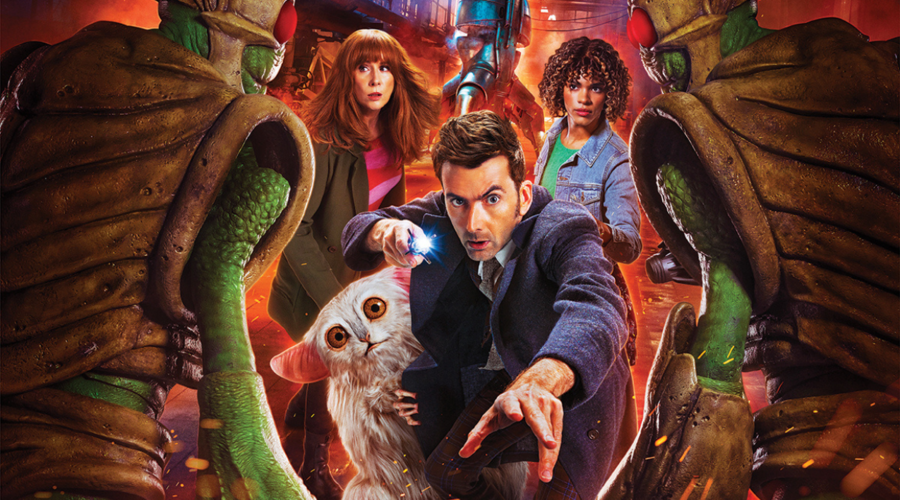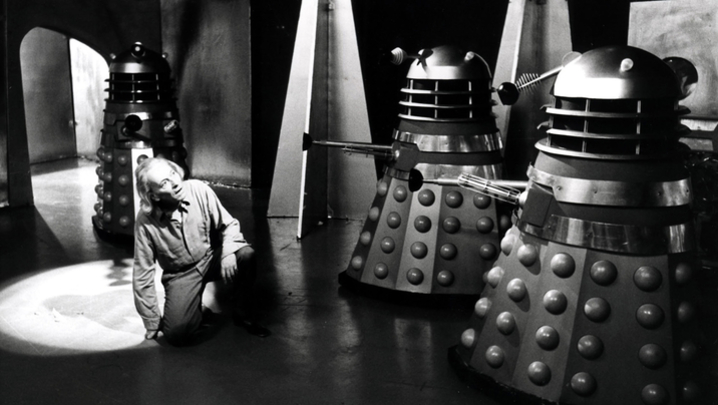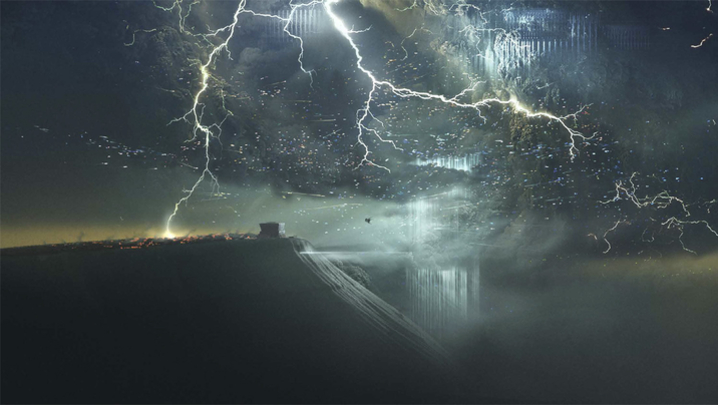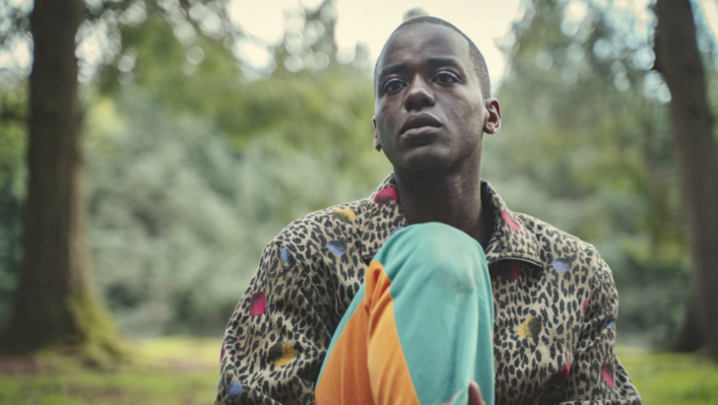Russell T Davies and Jane Tranter tell the RTS why the sci-fi classic is expanding its universe
Doctor Who is back, bigger and arguably better than before. RTS Cymru Wales was first off the mark, hosting a premiere in Cardiff two days before the show returned to BBC One. It was also 60 years to the day since the Time Lord first appeared on TV.
A roar rose from a sold-out audience at the conclusion of The Star Beast, which saw David Tennant and Catherine Tate return as the Doctor and his assistant after almost 15 years. Also back, as showrunner, was a visibly moved Russell T Davies.
“It’s been two years working on this. I’m properly proud of it,” he said. “It’s vast, this isn’t just a television programme arriving, there’s a whole empire of work and imagination, diligence and insight.”
As well as the Saturday-evening TV show, there is a behind-the-scenes companion show, Doctor Who: Unleashed, a Doctor Who podcast and in-vision commentary from Tennant on BBC iPlayer.
“Russell was really clear right from the start that, if we were going to come back… then we were going to come back and do something that was as big as it could possibly be,” recalled Jane Tranter, another Doctor Who veteran. “These days, if you’re doing a big franchise show… you don’t just watch the television programme, there’s masses of other stuff to look at, too.”
In 2003, when she was Controller of Drama Commissioning at BBC TV, Tranter asked Davies to revive the show, which had been rested by the corporation in 1989. Now, as CEO of Cardiff indie Bad Wolf, she makes Doctor Who.
Steffan Powell, the host of both Doctor Who: Unleashed and the Q&A following the premiere of The Star Beast, asked Davies: “Are you having fun?”
“Oh, God, yes. I wouldn’t do it if it wasn’t fun. It’s enormous fun,” he replied. “A lot of dramas are about people being murdered in alleyways; this is a lot more fun than that.
“There’s a lot of pride in it, there’s a Welsh pride, but there’s a family pride as well – and you know you’re working on something that is going to put a smile on people’s faces… that intergenerational span is a very rare phenomenon.”
Doctor Who has given the Welsh economy a huge boost – according to a recent BBC report, worth £134.6m over a couple of decades, as well as creating hundreds of jobs and acting as a catalyst for huge growth in the nation’s creative sector.
“I was always behind bringing it here,” said Davies. “I can remember when I was young, out playing in the street, and my dad would be standing in the door going, ‘Come and see, [Swansea actor] Margaret John’s on the television’, because she was in an episode of Z-Cars. It was so rare to see a Welsh person on the television… That whole visibility thing is vital.”
Looking back almost two decades to the revived Doctor Who, with Christopher Eccleston in the title role, Davies said: “When we arrived in 2005, there wasn’t that much science fiction on – in fact, we kind of paved the way, especially for British science fiction.
“I’ve watched Stranger Things and all the Marvel shows and Star Wars getting acclaim, and I love those shows, but I thought Doctor Who is as good as those… I think it’s better than those, to be honest.”
The very British Doctor Who – The Star Beast features Camden Lock Market and black cabs – will now be available beyond these shores on Disney+, the new global home for the sci-fi show outside the UK and Ireland.
“I don’t think that something needs to be international to have international appeal; actually, I think something just needs to be good… and it needs to have the opportunity to be seen,” said Tranter.
“Doctor Who has always been good, actually it’s been more than good – it’s been bloody brilliant – but it hasn’t always had an [international] platform.… Eventually, in May, when Disney+ really gets behind it, it will be taken all over the world.
“There will never be a time and there will never be a budget that means that, when Russell slips the script on to the table in front of us, we don’t go, ‘Whooa – how are we going to do that? [But the Disney deal] does mean that we have a better chance of running to keep up with him… it’s a significant difference.”
The Disney cash has been splashed on screen – the effects and action scenes are fantastic. But Davies underplayed the difference with previous series: “It’s different, but it’s not that different – you could imagine that David and Catherine would’ve run around the streets; [Star Beast monster] the Meep would have been a man in furry skin, or something, but we would’ve made it in the old days. It really is the same show.”
As ever with Davies’s Doctor Who, there’s more to it than running away from monsters. The Star Beast features a transgender storyline and actor, Yasmin Finney.
“It keeps you young, frankly, trying to write what the world is now,” said Davies. “I feel that very much as a gay man, actually; one of the things that drives me mad, and I’m also really glad of, is that, whenever you get an election or some fuss in the news, someone will bring up homosexuality, or rules about gayness or… things we’re allowed to do.
“Suddenly, we have to defend ourselves… but, although that’s terrible, I think at least it keeps me in tune with what’s going on. I kind of think that progressive politics keeps you open to the state of the world.”
Training TV’s next generation
Russell T Davies enthused about Doctor Who and Bad Wolf’s role in training TV’s next generation. ‘We’ve come back, not with just a show, but with a whole raft of opportunities to get into the [profession],’ he said. ‘This show will run and run…. It is an open door to make the creativity of this country be seen all over the world.’
Two trainees – working on Doctor Who thanks to Screen Alliance Wales – talked about how they landed work on the show. Screen Alliance Wales, a not-for-profit organisation based at Wolf Studios Wales, develops talent for TV and film in Wales.
‘I stumbled upon it; I didn’t know how to get into TV,’ admitted director’s assistant Abdoul Ceesay.
He had been working as a supporting artist. ‘One day, one of my friends told me about Screen Alliance Wales and how that was the best way to get into the industry. The job came up for a director’s assistant and I applied for it.’
He was offered an interview, so Ceesay immediately sought out the director’s assistant where he was working as a supporting artist for some pointers. His quick thinking worked and he landed the job.
Persistence paid off for scenic artist Luke Smith. He went to a Screen Alliance Wales ‘foot-in-the-door day’ in Newport. ‘I took my portfolio – and a model Dalek as well,’ he recalled.
Smith was given the email address of a contact at Screen Alliance Wales and ‘proceeded to email [her] for five months, every week, asking to come and do work experience. I finally got into prop fabrication, which was a different department from where I’m working now and they gave me one week of work experience.
‘Two days into that, I talked myself into a second week and then, one day after that, they asked to keep me on paid.’
Report by Matthew Bell. The RTS Cymru Wales event, in association with Bad Wolf and BBC Cymru Wales, was held at the Chapter Arts Centre in Cardiff on 23 November and produced by Edward Russell.





